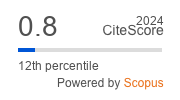Simulation of Hall field elements based on nanoscale silicon-on-insulator heterostructures
https://doi.org/10.17073/1609-3577-2020-2-109-115
Abstract
The article is devoted to the issues of numerical simulation of field Hall sensors based on the "silicon on insulator" structure with two control gates. To solve the problem, a two-level local-one-dimensional computational model is used. At the first level, a series of one-dimensional Schrödinger—Poisson equations are solved, which describe the distribution of the electron density across the heterostructure in different sections. The obtained information is transmitted to the second level, where the current characteristics of the element are calculated. The numerical simulation results are compared with the experimental data obtained for field Hall sensors. Comparative analysis shows good agreement between calculated and experimental data. The developed computer model makes it possible to carry out a multivariate analysis of various heterostructures, which creates the basis for optimizing devices of the class under consideration.
About the Authors
V. N. MordkovichRussian Federation
6 Academician Ossipyan Str., Chernogolovka, Moscow Region, 142432
Victor N. Mordkovich: Dr. Sci. (Phys.-Math.), Chief Researcher
K. K. Abgaryan
Russian Federation
44 Vavilov Str., Moscow 119333;
4 Volokolamskoe shosse, 4, Moscow 125993
Karine K. Abgaryan: Dr. Sci. (Phys.-Math.), Head of the Department
D. L. Reviznikov
Russian Federation
44 Vavilov Str., Moscow 119333;
4 Volokolamskoe shosse, 4, Moscow 125993
Dmitry L. Reviznikov: Dr. Sci. (Phys.-Math.), Professor
A. V. Leonov
Russian Federation
6 Academician Ossipyan Str., Chernogolovka, Moscow Region, 142432
Alexey V. Leonov: Cand. Sci. (Phys.-Math.), Researcher
References
1. Mordkovich V. N. Sensors based on silicon-on-insulator structures. Elektronnaya tekhnika. Series. 2. Poluprovodnikovye pribory = Electronic engineering. Ser. 2. Semiconductor devices, 2008, no. 2, pp. 34—44. (In Russ.)
2. Popovich R. S. Hall Effect Devices. Bristol (Philadelphia): IOP Publishing Ltd, 2004. 419 p.
3. Baranochnikov M. L., Leonov A. V., Mordkovich V. N., Pazhin D. M., Filatov M. M. Some features of magnetometric and sensor devices based on the field effect Hall sensor. Advanced Electromagnetics Symposium. Proceedings. Paris (France), 2012, pp. 455—459.
4. Mordkovich V. N., Baranochnikov M. L., Leonov A. V., Mokrushin A. D., Omelianovskaya N. M., Pazhin D. M. Field Hall device - a new type of magnetic field transducer. Datchiki i sistemy = Sensors and Systems, 2003, no. 7, pp. 33—38. (In Russ.)
5. Korolev M. A., Pavlyuk M. I., Devlikanova S. S. Physical model of SOI field-effect Hall sensor. Izvestiya vuzov. Elektronika = Proceedings of universities. Electronics, 2017, no. 2, pp. 166—170. (In Russ.). DOI: 10.24151/1561-5405-2017-22-2-166-170
6. Shcherbachev K. D., Bublik V. T., Mordkovich V. N., Pazhin D. M. Specific features of formation of radiation defects in the silicon layer in “silicon-on-insulator” structures. Semiconductors, 2011, vol. 45, no. 6, pp. 738—742. DOI: 10.1134/S1063782611060224
7. Mordkovich V. N., Pazhin D. M., Gromov D. V., Skorobogatov P. K. Relaxation effects in field Hall sensors influence of impulse ionizing irradiation. Elektronnaya tekhnika. Series. 2. Poluprovodnikovye pribory = Electronic engineering. Ser. 2. Semiconductor devices, 2011, no. 1, pp. 19—26. (In Russ.)
8. Korolev M. A., Kozlov A. V., Petrunina S. S. Functioning features of the SOI field-effect hall sensor designed for application in telecommunications networks. Trudy MFTI, 2015, vol. 7, no. 3, pp. 91—95. (In Russ.)
9. Leonov A. V., Malykh A. A., Mordkovich V. N., Pavlyuk M. I. A magnetosensitive thin-film silicon Hall-type field-effect transistor with operating temperature range expanded up to 350 °C. Tech. Phys. Lett., 2016, vol. 42, no. 1, pp. 71—74. DOI: 10.1134/S1063785016010272
10. Leonov A. V., Malykh A. A., Mordkovich V. N., Pavlyuk M. I. Field controlled Si Hall element with extended operation temperature range from liquid helium temperature up to 650 K. Proc. Engineering, 2015, vol. 120, pp. 1197—1200. DOI: 10.1016/j.proeng.2015.08.786
11. Abgaryan K. K., Reviznikov D. L. Vychislitel'nye algoritmy v zadachakh modelirovaniya i optimizatsii poluprovodnikovykh geterostruktur [Computational algorithms in problems of modeling and optimization of semiconductor heterostructures]. Moscow: MAKS Press, 2016,120 p. (In Russ.)
12. Abgaryan K. K., Reviznikov D. L. Numerical simulation of the distribution of charge carrier in nanosized semiconductor heterostructures with account for polarization effects. Comput. Math. and Math. Phys., 2016, vol. 56, pp. 161—172. DOI: 10.1134/S0965542516010048
13. Abgaryan K. K., Mutigullin I. V., Reviznikov D. L. Computational model of 2DEG mobility in the AlGaN/GaN heterostructures. Phys. Status Solidi (c), 2015, vol. 12, no. 4–5, pp. 460—465. DOI: 10.1002/pssc.201400200
14. Abgaryan K. K., Mutigullin I. V., Reviznikov D. L. Theoretical investigation of 2DEG concentration and mobility in the AlGaN/GaN heterostructures with various Al concentrations. Phys. Status Solidi (c), 2015, vol. 12, no. 12, pp. 1376—1382. DOI: 10.1002/pssc.201510159
15. Vasileska D., Goodnick S. M., Goodnick S. Computational Electronics: Semiclassical and Quantum Device Modeling and Simulation, CRC Press, 2010.
16. Stengel F., Noor Mohammad S., Morkoç H. Theoretical investigation of electrical characteristics of AlGaN/GaN modulation doped field-effect transistors. J. Appl. Phys., 1996, vol. 80, no. 5, pp. 3031—3042. DOI: 10.1063/1.363162
17. Naumova O. V., Zaitseva E. G., Fomin B. I., Ilnitsky M. A., Popov V. P. Density dependence of electron mobility in the accumulation mode for fully depleted SOI films. Semiconductors, 2015, vol. 49, no. 10, pp. 1316—1322. DOI: 10.1134/S106378261510017
18. Sze S. M. Physics of Semiconductor Devices. Wiley-Interscience, 1981, 880 p.
Review
For citations:
Mordkovich V.N., Abgaryan K.K., Reviznikov D.L., Leonov A.V. Simulation of Hall field elements based on nanoscale silicon-on-insulator heterostructures. Izvestiya Vysshikh Uchebnykh Zavedenii. Materialy Elektronnoi Tekhniki = Materials of Electronics Engineering. 2020;23(2):109-115. (In Russ.) https://doi.org/10.17073/1609-3577-2020-2-109-115






































